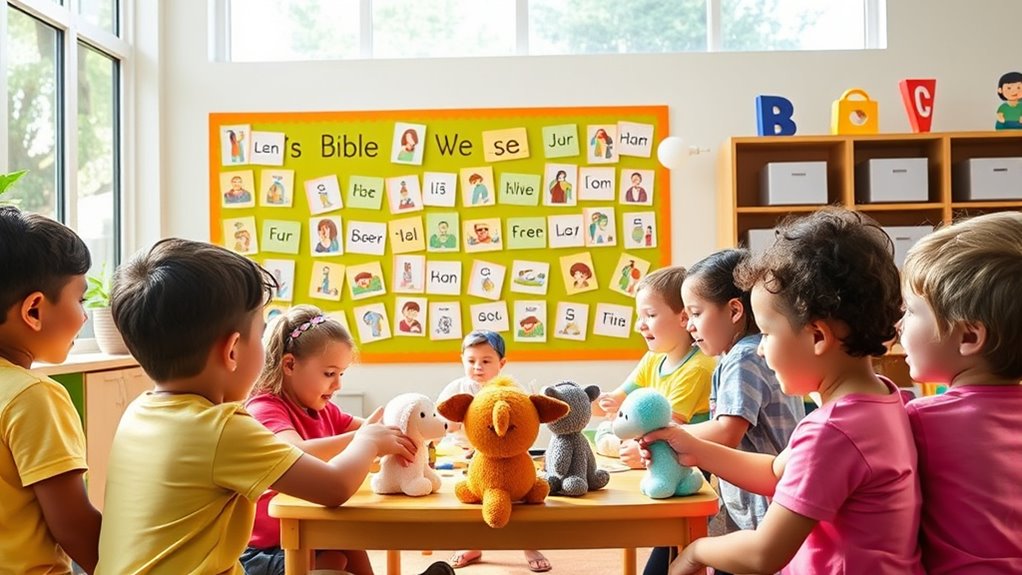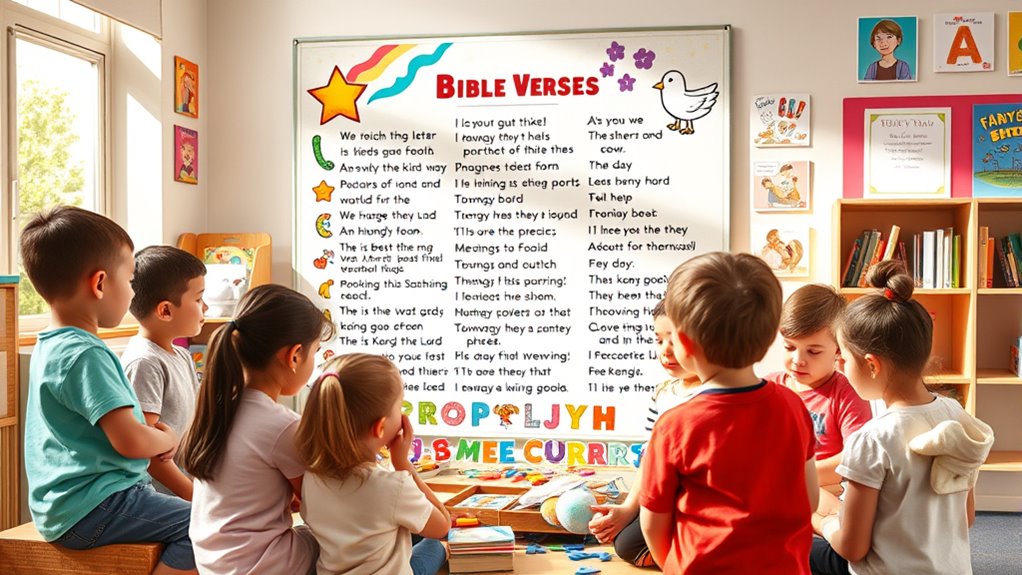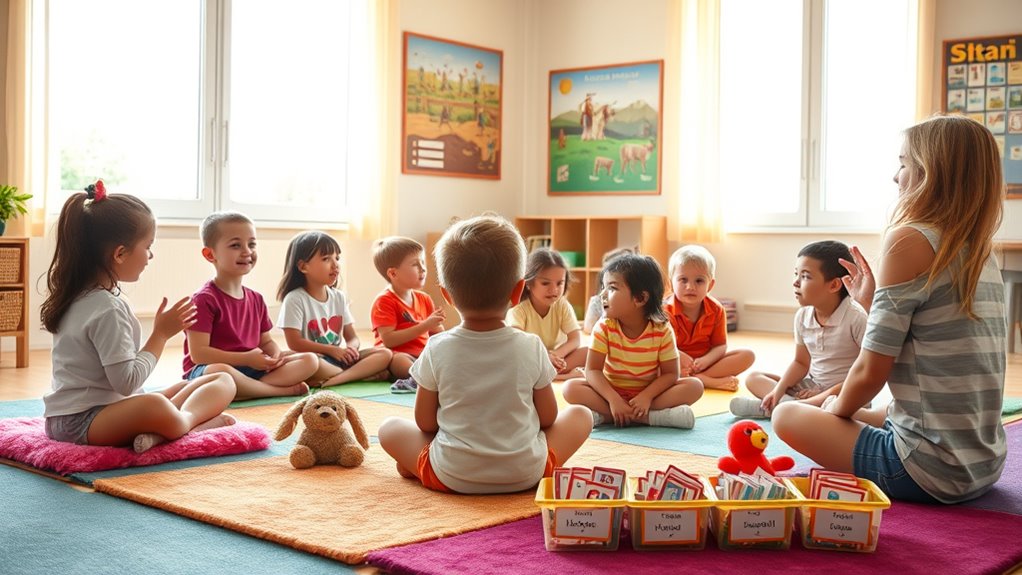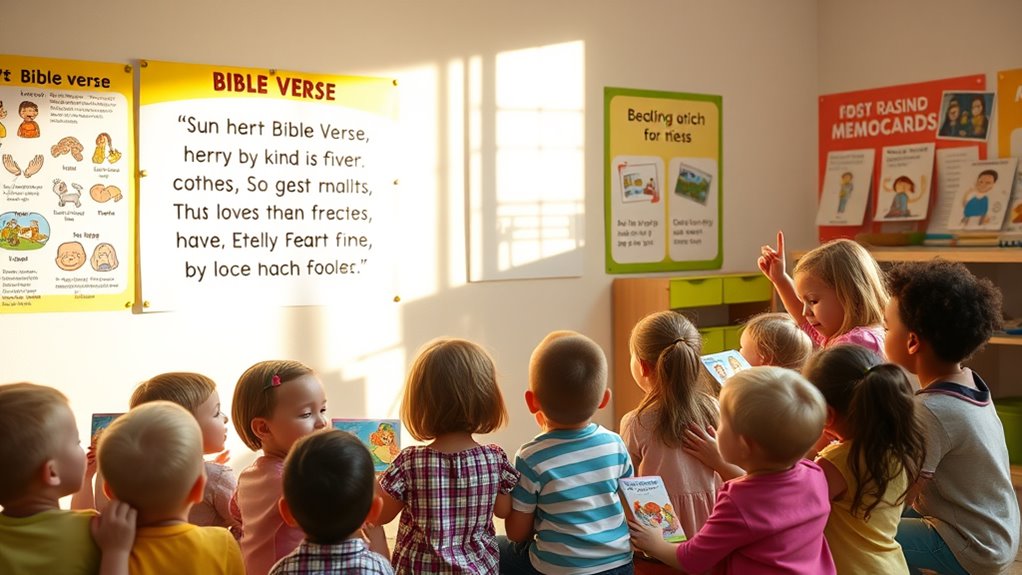To help kids build Bible memory, make it fun and engaging by using games, competitions, and colorful props. Incorporate visual aids like charts, flashcards, and storytelling to boost understanding. Establish consistent routines with rewards and peer support to build habits. Use catchy songs and rhymes to make verses stick more easily. Create a positive, relaxed environment that celebrates progress, so your child stays motivated and loves memorizing Scripture—keep exploring for more helpful ideas.
Key Takeaways
- Make memorization fun with games, competitions, and colorful props to keep kids motivated.
- Use visual aids like charts, flashcards, and storytelling to help children understand and remember scripture.
- Establish consistent practice routines with rewards and peer support to build lasting memory habits.
- Incorporate songs, rhymes, and melodies to make verses catchy and easier to recall.
- Create a positive, pressure-free environment that encourages praise and nurtures a love for Scripture.
Making Memorization Fun and Engaging

To help kids enjoy memorizing Bible verses, making the process fun and engaging is essential. One effective way is through interactive games that turn learning into a lively activity. For example, you can create matching games where kids pair verses with their meanings or key words. Incorporate themed competitions, like a memory verse relay race, to motivate kids to practice together. These activities foster friendly competition while reinforcing memory. Using colorful props or themed challenges keeps children excited and focused. When kids associate Bible memorization with fun, they’re more likely to stay motivated and retain what they learn. Remember, the goal is to make memorizing a positive, energetic experience that sparks their love for Scripture.
Incorporating Visual Aids and Creative Tools

Building on fun and engaging activities, incorporating visual aids and creative tools can make Bible memorization even more effective. Use colorful charts, flashcards, and storytelling techniques to help your kids visualize scripture. Interactive games, like matching or fill-in-the-blank activities, reinforce memory while keeping kids excited. Visual aids turn abstract verses into concrete images, making recall easier. Here’s a visual of how you might organize tools:
| Visual Aids | Creative Tools |
|---|---|
| Illustrated storyboards | Scripture-themed crafts |
| Flashcards with pictures | Memory verse posters |
| Charts with key words | Role-playing activities |
| Scripture puzzles | Song and rhythm aids |
| Visual timelines | Creative writing exercises |
These approaches deepen understanding and make memorization lively and memorable.
Establishing Consistent Practice Routines

Establishing a consistent practice routine is essential for helping kids retain Bible verses and develop a lasting habit. When you set a regular schedule, kids know what to expect, making practice feel natural rather than forced. Incorporate motivational rewards to encourage progress—small treats or praise can boost their enthusiasm. Peer accountability also plays a crucial role; encourage kids to practice together or share verses with friends or family members. This builds a sense of community and motivation, helping them stay committed. Keep routines simple and manageable, so kids don’t feel overwhelmed. Consistency, combined with positive reinforcement and peer support, creates a powerful environment for building strong Bible memory skills that last.
Using Songs and Rhymes to Aid Recall

Using songs and rhymes makes Bible verses more memorable by creating catchy melodies that stick in kids’ minds. The rhythm helps them recall details more easily, and repeated singing reinforces what they learn. Incorporating these tools into practice can markedly boost kids’ ability to remember scripture.
Catchy Melodies Enhance Memory
Songs and rhymes are powerful tools that can make memorizing Bible verses more engaging and effective. Catchy melodies help kids remember scripture by creating strong associations in their minds. Incorporate musical instruments or upbeat tunes to make the learning process fun and memorable. Using storytelling techniques alongside these melodies captures children’s attention and makes the verses more meaningful. When a song has a lively rhythm, kids are more likely to recall the words because the melody becomes linked with the message. Repetition of these melodies reinforces memory, allowing children to internalize scripture effortlessly. By combining musical instruments, storytelling, and catchy tunes, you create an enjoyable environment that boosts memorization skills and helps God’s Word stay with them longer.
Rhythms Make Recall Easier
Have you noticed how a catchy rhyme or rhythm can make a Bible verse stick in your mind? Using rhythms during daily routines or sensory activities helps kids remember verses more easily. When you set Bible memory to a simple beat or rhyme, it becomes part of their natural flow, making recall smoother. Incorporate songs or rhythmic chants into daily tasks like brushing teeth or car rides—these moments turn into fun, memorable times. Rhythms create a pattern that the brain recognizes, helping children internalize scripture more effortlessly. By making Bible verses rhythmic, you tap into their love for music and movement, making memory work feel less like a chore and more like a natural part of their day. This approach encourages lasting recall through engaging, sensory-rich learning.
Repetition Reinforces Learning
Repetition is a powerful tool for helping kids remember Bible verses, especially when combined with engaging melodies and rhymes. This approach enhances rote memorization and boosts cognitive reinforcement, making learning both fun and effective. When kids sing or recite verses repeatedly, they strengthen neural pathways, solidifying their memory. To visualize this, consider the following:
| Repetition Method | Benefits |
|---|---|
| Songs & Rhymes | Improve recall through melody |
| Repeated Recitation | Reinforces memory pathways |
| Engaging Activities | Make learning enjoyable |
Using these techniques, you turn memorization into an interactive experience that sticks. Kids are more likely to remember verses when learning feels like a musical adventure, not just a chore.
Creating a Supportive Memory Environment

Creating a supportive environment is essential for helping kids memorize Bible verses effectively. You can do this by using positive reinforcement to celebrate their efforts and progress, which boosts confidence and motivation. Praise specific achievements, like recalling a verse correctly, to encourage ongoing effort. Peer encouragement also plays a crucial role; when children practice together, they build a sense of camaraderie and shared purpose. Arrange group activities or memory challenges that foster teamwork and mutual support. Keep the environment relaxed and free of pressure, so kids feel safe making mistakes and learning at their own pace. By combining positive reinforcement with peer encouragement, you create a nurturing space where kids are motivated to memorize Scripture and develop a lasting love for God’s Word.
Celebrating Progress and Encouraging Confidence

Celebrating progress and encouraging confidence helps children see their achievements and stay motivated. When you use positive reinforcement, you reinforce their efforts and build their self-esteem. Recognize even small victories, like memorizing a new verse or reciting confidently. Make sure to set age-appropriate challenges that are achievable, so kids feel a sense of accomplishment without frustration. Praise their perseverance and effort, not just the results, to foster a growth mindset. Celebrate milestones regularly, whether through simple words of encouragement, a high five, or a small reward. This approach helps children develop confidence in their ability to memorize scripture, making Bible memory a positive and rewarding experience. Consistent encouragement keeps them enthusiastic and eager to learn more.
Frequently Asked Questions
How Can I Adapt Bible Memory Techniques for Children With Learning Differences?
When adapting Bible memory techniques for children with learning differences, you should use multisensory strategies like hands-on activities and movement to reinforce learning. Incorporate visual aids such as colorful charts or picture cards to enhance understanding and retention. By engaging multiple senses and providing visual support, you make the process more accessible and enjoyable, helping children with diverse learning styles connect with scripture in a meaningful way.
What Are Some Common Challenges Kids Face When Memorizing Bible Verses?
Kids often face challenges like short attention spans, difficulty with memorization strategies, and low motivation techniques when learning Bible verses. They may become easily distracted or discouraged. To support them, you should use engaging memorization strategies like repetition, visuals, or songs, and boost motivation by celebrating progress and making activities fun. This approach helps kids stay focused, build confidence, and develop a lasting connection with scripture.
How Early Should Children Start Memorizing Bible Verses?
You might think kids need to wait until they’re older to start memorizing Bible verses, but beginning in early childhood actually boosts faith development. Early exposure helps children internalize God’s Word naturally, making it easier for them to recall and apply it. Plus, young minds are like sponges—quick to absorb spiritual truths—so starting now sets a strong foundation for their faith journey as they grow.
Are There Recommended Age-Appropriate Bible Verses for Memorization?
You’re wondering if there are age-appropriate verses for memorization. Yes, start with simple, short verses that match your child’s age and understanding. Use memorization tips like repetition, songs, and visual aids to make it fun and effective. As they grow, introduce longer or more complex verses. Tailoring the verses to your child’s developmental stage helps build confidence and keeps Bible memorization engaging.
How Can I Involve Siblings or Friends in the Memorization Process?
Think of memorization as a team sport, where everyone plays a part. You can involve siblings or friends through fun group activities and friendly competitions, making the process lively and engaging. Set challenges like who can recite verses longest or with the most expression. These activities boost motivation, foster teamwork, and make Bible memory a shared adventure, helping everyone stay committed and excited about learning God’s Word together.
Conclusion
By making Bible memory fun, engaging, and consistent, you create a foundation that lasts a lifetime. Remember, you’re planting seeds of faith that can blossom through creative tools and loving support. With patience and encouragement, you turn the challenge into a joyful journey—transforming small steps into giant leaps of spiritual growth. After all, isn’t it worth lighting a spark that can shine brightly forever? Together, you can help kids cherish God’s Word with every memory they make.










